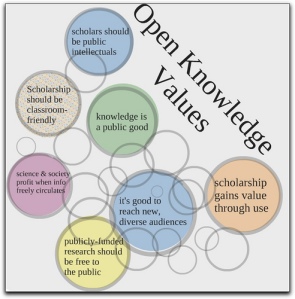- About
- Aphasia
- Caregiver and Patient Education
- Dementia
- Interviews with Leading Speech Pathologists
- Neuro Anatomy and Physiology
- New and Noteworthy
- Posts & Editorials
- Reviews
- Stroke (CVA- Cerebro Vascular Accident)
- Student Handbook
- Swallowing
- Traumatic Brain Injury
- Voice
- Disclaimer
- Explore Other Great Websites
Breaking Down Walls
What do Duke, Harvard, Stanford, MIT, the National Institutes of Health, the National Science Foundation, the Max Planck Society (Germany), and many other public and private institutions both in the US and abroad have in common? They have all decided to allow open access publishing to flourish.
Don’t know what open access publishing is? Well, you’re not alone. I read a good primer on the subject written by Peter Suber, Director of the Harvard Open Access Project, to get up to speed. In this introduction piece, he details many of the most important ideas about open access. Here’s how he defines it, “Open-access (OA) literature is digital, online, free of charge, and free of most copyright and licensing restrictions.”
Another good read on the subject comes from the Budapest Open Access Initiative. This group is made up of international scholars from Quebec to London. An excerpt from their mission statement reads:
The old tradition is the willingness of scientists and scholars to publish the fruits of their research in scholarly journals without payment, for the sake of inquiry and knowledge. The new technology is the internet. The public good they make possible is the world-wide electronic distribution of the peer-reviewed journal literature and completely free and unrestricted access to it by all scientists, scholars, teachers, students, and other curious minds. Removing access barriers to this literature will accelerate research, enrich education, share the learning of the rich with the poor and the poor with the rich, make this literature as useful as it can be, and lay the foundation for uniting humanity in a common intellectual conversation and quest for knowledge.
If their statement sounds a little too Utopian for you because we all know that we can’t get something for nothing, then I have another question for you to consider: why do we pay tax dollars to support public research that is only available to researchers and students who also pay for the privilege to read the research from journals that the publicly supported colleges are subscribing to for increasingly larger fees? To me, that sounds more like we’ve flipped the old adage on its head; we can get nothing for something.
How do we fit in? Speech pathologists often have a hard time gaining access to the robust data being put out by our research community. Because we don’t have access to quality literature on new methodologies, we focus on gaining certifications in unproven treatments (Vital Stim, DPNS, Beckman Oral Motor, Myofascial Release, etc.) vs. having open access to research on those same treatment methodologies as they are being proven or dis-proven and then getting hands on training as needed. I’m not trying to make a value statement on whether the above therapies are “good” or “bad”, but simply that the research that is out there is either meager or fractured to the point that it’s quite difficult to access it.
We also fracture our knowledge base by having specialized periodicals that are only available through additional membership costs, to the tune of another $90-$270 dollars a year if you got anywhere from 6 to all 18 SIG periodicals. The problem is that much of the best research is unavailable because of cost. (Who wants to pay $45 for a single article that may or may not help your clinical practice?) ASHA needs to make its periodicals of all kinds open access. Furthermore, all public institutions should adopt OA friendly policies that help shift the paradigm. But, one thing at a time, right?
The benefits for ASHA and the researchers, who need specialized recognition to advance within academia, are more than just warm fuzzy feelings that they have done the right thing. I believe that there are many benefits to be had with open access: increased publicity for researchers and their work, wider distribution and increased public awareness, more dialogue between researchers and clinicians, a serious reduction in the bottle-necking of information, and most importantly- better patient outcomes.
Journal articles are only part of what will help provide increasing publicity and public awareness of what we do. Take a look at Khan Academy (http://www.khanacademy.org/) for inspirational, altruistic education on a wide array of science, math, and art courses. Or look at the Massachusetts Institute of Technology’s free access to a whole laundry list of classes. Many of the same institutions that have signed on to OA publishing are also doing similar things with class offerings.
While all of this is wonderful and impressive, it’s not head-in-the-clouds craziness from expensive universities that can afford to try out the latest internet fad. What do I get as an individual from taking the class on Calculus from MIT? I don’t work toward a degree. I can’t transfer the credit hours. I do gain knowledge and the sense of accomplishment; no small accomplishment for me to pass their Calculus class by the way. Really then, this is good PR for MIT. It’s good exposure and it makes good business sense. We shouldn’t miss out on the same opportunities within our own field. We have the opportunity to make a real difference. We will lose nothing, enrich the learning of fellow SLPs and curious minds alike, and gain an immense amount of quality exposure on a national and global scale.
Sounds like a win to me.
Here are some links to check out if your curious about how some of the other universities have gone about it:
http://library.duke.edu/openaccess/
http://ed.stanford.edu/faculty-research/open-archive/open-access-motion
http://libraries.mit.edu/sites/scholarly/mit-open-access/open-access-at-mit/mit-open-access-policy/
6 comments on “Breaking Down Walls”
Leave a reply to Admin Cancel reply
Information
This entry was posted on June 7, 2012 by Admin in Editorial and tagged ASHA, Beckman Oral Motor, Budapest Open Access Initiative, copyright restrictions, costs, curious minds, distribution, DPNS, Duke, free of charge, global, Harvard, Harvard Open Access Project, internet access, journals, khan academy, Max Planck Society, MIT, Myofascial Release, national, National Institutes of Health, National Science Foundation, NIH, OA, online, open access, Peter Suber, PR, Public funding, publicity, removing barriers, SIG, speech language pathology, Stanford, treatment methodologies, Utopian, Vital Stim.Shortlink
https://wp.me/p2mvBx-8NBlog Stats
- 1,049,263 hits


Yes, this is so true. I personally consider myself an autodidact ever since obtaining my Master’s in SLP in 1980. Bring it on! Where are all the SLPs who love learning! The info is out there.
On the topic of certifications: With 30 + yrs of experience in adult swallowing and communication, I have refused to become certified in techniques that have little or no evidence in the literature. I will not even work at a facility that supports it. Unfortunately, we have less and less money for education in our department except there is an open budget for certification. PT and OT have many opportunities for this but not speech.
You are so right. Thank you for a well written article on this very important issue.
Thanks to both of you. I’ll try to keep the content coming :)
Thanks for this. It really is unfortunate that finding free literature is difficult. There are too many SLPs providing treatments that are not evidence based. I’m always trying to keep up with the most recent research and its nice to see others out there doing the same.
Your welcome. This has been such a fun project for me. Thanks for your feedback. I hope to continue to see this site expand and get more community input (some is already in the works for voice and swallowing). We really do need easier, centralized access to information so that we can provide high quality service to our patients.
With as many smart SLPs out there, I’m sure we can help build a better network with and without Open Access journals.
I find this to be an intriguing topic. I agree that the information that ASHA has is hidden from those you are not part of the organization, and in fact you can’t join the organization unless you are fully certified.
That leads me to another irritation…the cost of apps that are aimed at the speech therapy profession, the cost is astronomical compared to other apps, which are of high quality and affordable. But type speech therapy into the ITunes Store, and you get back a large amount of apps priced above fifty dollars. Frankly twenty dollars is pushing the limit. Much like the high price of Mayer Johnson software, the app business and AAC especially, is he’ll bent on making money from people who cannot speak. It’s kind of sickening.